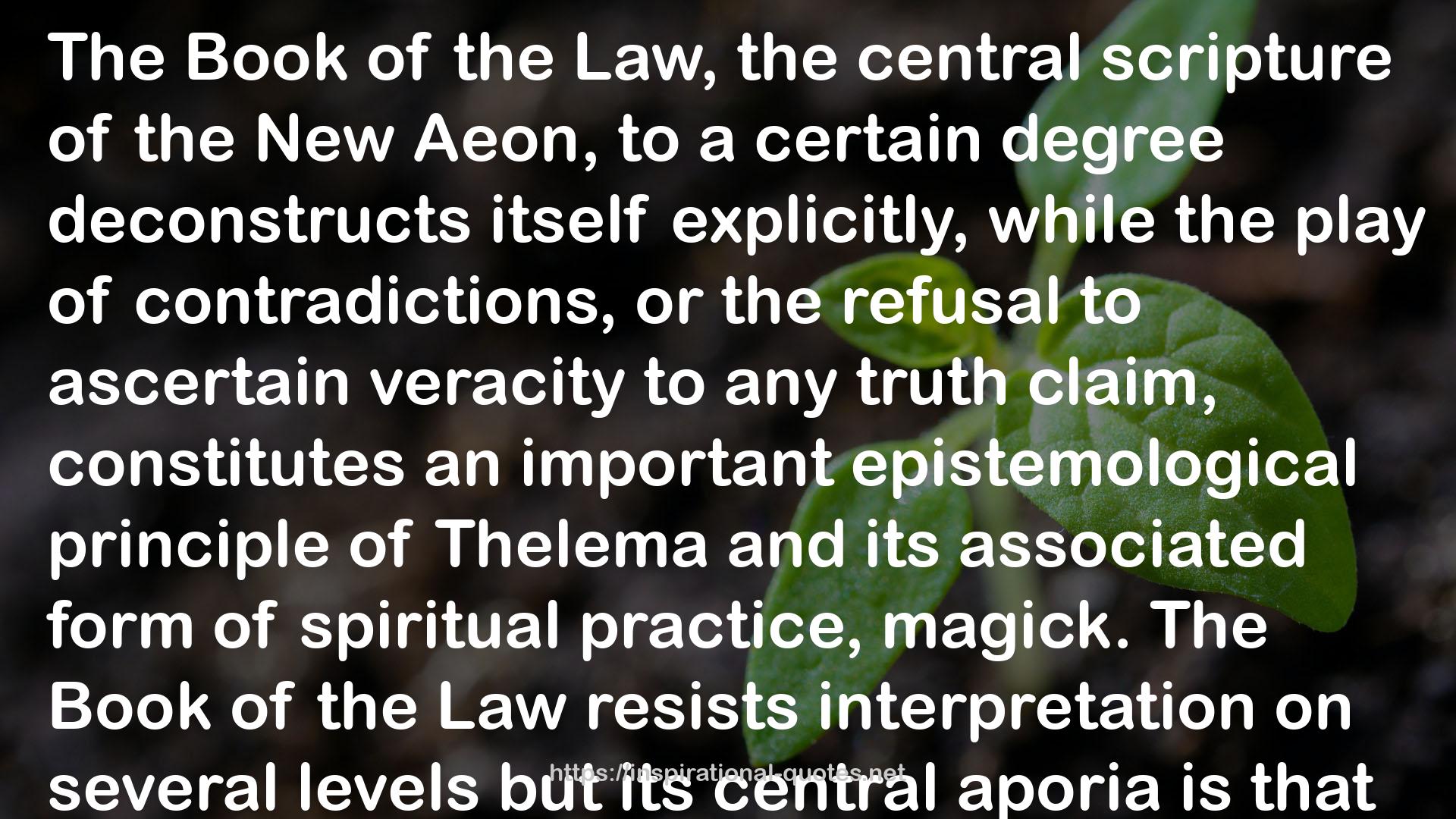" The Book of the Law, the central scripture of the New Aeon, to a certain degree deconstructs itself explicitly, while the play of contradictions, or the refusal to ascertain veracity to any truth claim, constitutes an important epistemological principle of Thelema and its associated form of spiritual practice, magick. The Book of the Law resists interpretation on several levels but its central aporia is that it proclaims the law, which generally refers to a restrictive force, the message of which is freedom, expressed through a precept “Do what thou wilt” (AL I:40), while “The word of Sin is Restriction” (AL I: 41). The ‘key’ to the book, similarly, consists of the interplay between concepts AL, meaning God, and LA, meaning Not: the one negates the other, while both simultaneously coexist in the sate of coincidentia oppositorum. "
― , The Birth of the New Aeon: Magick and Mysticism of Thelema from the Perspective of Postmodern A/Theology
Image for Quotes

The Book of the Law, the central scripture of the New Aeon, to a certain degree deconstructs itself explicitly, while the play of contradictions, or the refusal to ascertain veracity to any truth claim, constitutes an important epistemological principle of Thelema and its associated form of spiritual practice, magick.
The Book of the Law resists interpretation on several levels but its central aporia is that it proclaims the
law, which generally refers to a restrictive force, the message of which is
freedom, expressed through a precept “Do what thou wilt” (AL I:40), while “The word of Sin is Restriction” (AL I: 41). The ‘key’ to the book, similarly, consists of the interplay between concepts AL, meaning God, and LA, meaning Not: the one negates the other, while both simultaneously coexist in the sate of
coincidentia oppositorum." style="width:100%;margin:20px 0;"/>
 The Book of the Law, the central scripture of the New Aeon, to a certain degree deconstructs itself explicitly, while the play of contradictions, or the refusal to ascertain veracity to any truth claim, constitutes an important epistemological principle of Thelema and its associated form of spiritual practice, magick. The Book of the Law resists interpretation on several levels but its central aporia is that it proclaims the law, which generally refers to a restrictive force, the message of which is freedom, expressed through a precept “Do what thou wilt” (AL I:40), while “The word of Sin is Restriction” (AL I: 41). The ‘key’ to the book, similarly, consists of the interplay between concepts AL, meaning God, and LA, meaning Not: the one negates the other, while both simultaneously coexist in the sate of coincidentia oppositorum." style="width:100%;margin:20px 0;"/>
The Book of the Law, the central scripture of the New Aeon, to a certain degree deconstructs itself explicitly, while the play of contradictions, or the refusal to ascertain veracity to any truth claim, constitutes an important epistemological principle of Thelema and its associated form of spiritual practice, magick. The Book of the Law resists interpretation on several levels but its central aporia is that it proclaims the law, which generally refers to a restrictive force, the message of which is freedom, expressed through a precept “Do what thou wilt” (AL I:40), while “The word of Sin is Restriction” (AL I: 41). The ‘key’ to the book, similarly, consists of the interplay between concepts AL, meaning God, and LA, meaning Not: the one negates the other, while both simultaneously coexist in the sate of coincidentia oppositorum." style="width:100%;margin:20px 0;"/>